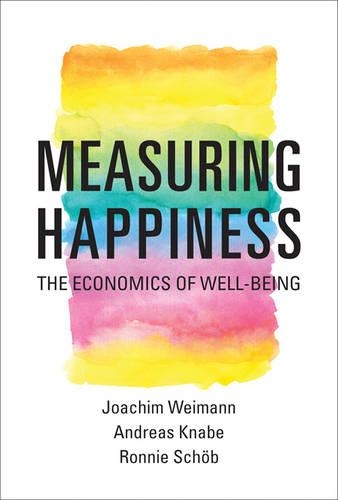
Measuring Happiness: The Economics of Well-Being
(Paperback)
Publishing Details
Measuring Happiness: The Economics of Well-Being
By (Author) Joachim Weimann
By (author) Andreas Knabe
By (author) Ronnie Schb
MIT Press Ltd
MIT Press
2nd September 2016
2nd September 2016
United States
Classifications
Professional and Scholarly
Non Fiction
Psychology
158.1
Physical Properties
Paperback
224
Width 152mm, Height 229mm, Spine 14mm
Description
An investigation of the happiness-prosperity connection and whether economists can measure well-being.Can money buy happiness Is income a reliable measure for life satisfaction In the West after World War II, happiness seemed inextricably connected to prosperity. Beginning in the 1960s, however, other values began to gain ground- peace, political participation, civil rights, environmentalism. "Happiness economics"-a somewhat incongruous-sounding branch of what has been called "the dismal science"-has taken up the puzzle of what makes people happy, conducting elaborate surveys in which people are asked to quantify their satisfaction with "life in general." In this book, three economists explore the happiness-prosperity connection, investigating how economists measure life satisfaction and well-being. The authors examine the evolution of happiness research, considering the famous "Easterlin Paradox," which found that people's average life satisfaction didn't seem to depend on their income. But they question whether happiness research can measure what needs to be measured. They argue that we should not assess people's well-being on a "happiness scale," because that necessarily obscures true social progress. Instead, rising income should be understood as increasing opportunities and alleviating scarcity. Economic growth helps societies to sustain freedom and to finance social welfare programs. In this respect, high income may not buy happiness with life in general, but it gives individuals the opportunity to be healthier, better educated, better clothed, and better fed, to live longer, and to live well.
Reviews
Strikes a great balance between the popular and the scientific. It explains a great number of scientific studies very clearly so as to make happiness research extremely accessible to, and enjoyable for, non-economists. For the more scientifically minded, it contains an appendix with an expansion of all the hard-core data. This means that the book reaches a wide audience, from philosophers, for whom it adds an empirical perspective on happiness, to the educated general public interested in the connection between money and happiness, to students in economics, philosophy, sociology, and psychology. The authors also find middle ground between objectively presenting the facts and making a case for their interpretation of them. This does not at any point seem forced, which speaks to the persuasiveness of their arguments. It is quite a feat to present, summarize, and synthesize so many different studies in happiness research and all their diverging, conflicting conclusions, and have the result read like a coherent narrative about money and happiness with a good plot rather than as an over- whelming number of facts. All in all, this is a clearly organized and well-written book that addresses the relationship between money and happiness. Its major strengths are its accessibility, its thorough presentation of the findings of happiness research, and its critical examination of the value and limitations of this research. Measuring Happiness makes you appreciate both how valuable and how limited happiness research really is.
Journal of Happiness StudiesAuthor Bio
Joachim Weimann is Full Professor of Economic Policy at Otto-von-Guericke-Universit t Magdeburg, and head of MaXlLab, the Magdeburg Laboratory for Experimental Economics. Andreas Knabe is Full Professor and Chair of Public Economics at Otto-von-Guericke-Univers t Magdeburg. Ronnie Sch b is Full Professor of International Public Economies at the School of Business and Economics at Freie Universit t in Berlin.
